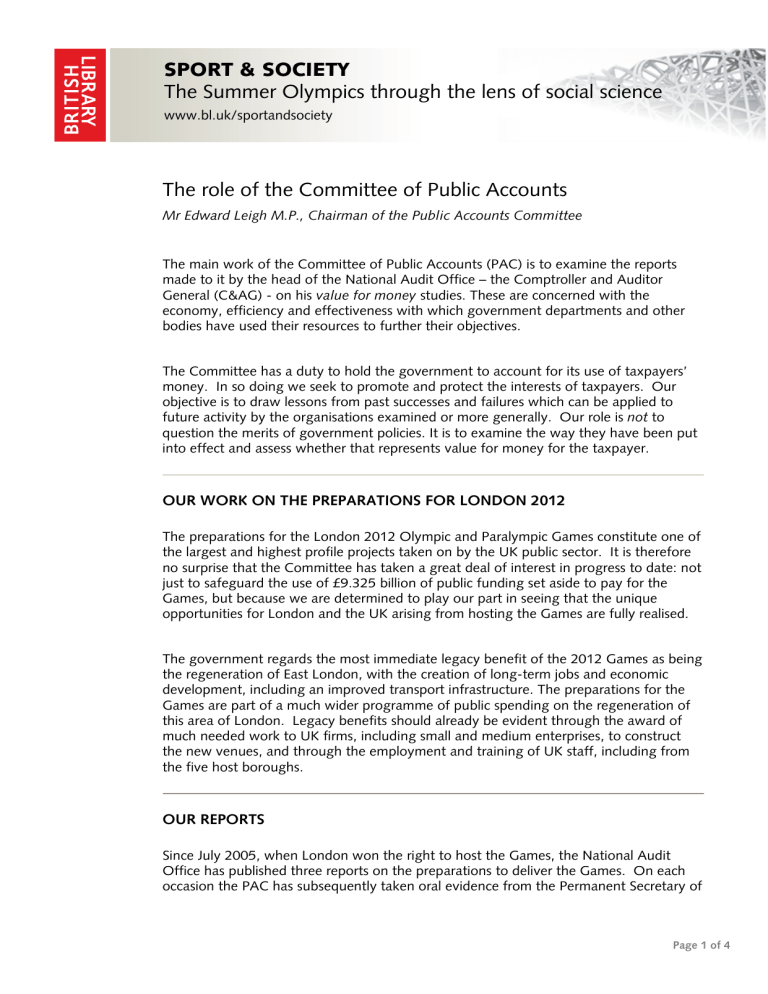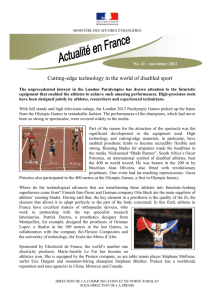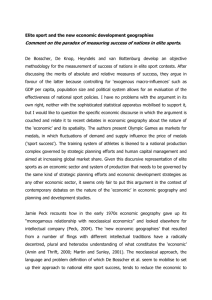The role of the Committee of Public Accounts (PDF 95KB)

SPORT & SOCIETY
The Summer Olympics through the lens of social science
www.bl.uk/sportandsociety
The role of the Committee of Public Accounts
Mr Edward Leigh M.P., Chairman of the Public Accounts Committee
The main work of the Committee of Public Accounts (PAC) is to examine the reports made to it by the head of the National Audit Office – the Comptroller and Auditor
General (C&AG) - on his value for money studies. These are concerned with the economy, efficiency and effectiveness with which government departments and other bodies have used their resources to further their objectives.
The Committee has a duty to hold the government to account for its use of taxpayers’ money. In so doing we seek to promote and protect the interests of taxpayers. Our objective is to draw lessons from past successes and failures which can be applied to future activity by the organisations examined or more generally. Our role is not to question the merits of government policies. It is to examine the way they have been put into effect and assess whether that represents value for money for the taxpayer.
OUR WORK ON THE PREPARATIONS FOR LONDON 2012
The preparations for the London 2012 Olympic and Paralympic Games constitute one of the largest and highest profile projects taken on by the UK public sector. It is therefore no surprise that the Committee has taken a great deal of interest in progress to date: not just to safeguard the use of £9.325 billion of public funding set aside to pay for the
Games, but because we are determined to play our part in seeing that the unique opportunities for London and the UK arising from hosting the Games are fully realised.
The government regards the most immediate legacy benefit of the 2012 Games as being the regeneration of East London, with the creation of long-term jobs and economic development, including an improved transport infrastructure. The preparations for the
Games are part of a much wider programme of public spending on the regeneration of this area of London. Legacy benefits should already be evident through the award of much needed work to UK firms, including small and medium enterprises, to construct the new venues, and through the employment and training of UK staff, including from the five host boroughs.
OUR REPORTS
Since July 2005, when London won the right to host the Games, the National Audit
Office has published three reports on the preparations to deliver the Games. On each occasion the PAC has subsequently taken oral evidence from the Permanent Secretary of
Page 1 of 4
Sport and Society: the Summer Olympics through the lens of social science the Department for Culture Media and Sport, the Department responsible for the delivery of the Games and the Chief Executive of the Olympic Delivery Authority, the
Agency responsible for the construction of the new venues and infrastructure.
The National Audit Office has also published two reports on the funding to support elite athletes. The PAC held hearings on both occasions, again with the Permanent Secretary, but this time with the Chief Executive of UK Sport, the Agency responsible for funding to support elite athletes.
Each of the hearings was followed by a report from the Committee:
On the preparations for London 2012:
• our first report
covered the main risk areas that need to be addressed if the
London 2012 programme is to be successfully delivered;
• our second report
examined the development of the publicly funded budget for the Games. The report looked at the reasons why the budget had grown from
£3.4 billion at the time of the bid to the £9.325 billion budget announced in
March 2007;
• our third report
acknowledged the good progress being made on the construction of the venues and infrastructure, but highlighted the need for strong change control, as the attention of the International Olympics Committee and other influential stakeholders now turned from Beijing to London.
On the support for elite athletes:
• our first report
examined the use of lottery money to support elite athletes competing in Athens in 2004 and Turin in 2006, and the plans for Beijing in 2008 and London in 2012;
• our second report
focused on the preparations for host nation sporting success at London 2012 and followed up the recommendations made in our earlier report on funding to support elite athletes
Our work and reports to date on the preparations for London 2012 and support for elite athletes have served to improve the accountability for this very important project and, we hope, public understanding of it.
1 39 th Report, 2006-2007, HC377
2 14 th Report, 2007-2008, HC85
3 50th Report, 2007-2008, HC890
4 54th Report, 2005-2006, HC898
5 42nd Report, 2007-2008, HC477
The Role of the Committee of Public Accounts Page 2 of 4
Sport and Society: the Summer Olympics through the lens of social science
THEMES COVERED BY THE COMMITTEE
On the preparations for London 2012
The recommendations in our reports have led to improvements in the management of the programme and kept the delivery organisations for London 2012 focused on key risks. Given the scale, pace and complexity of the programme, we can expect to see new issues emerging in the run-up to 2012, including how the public sector is managing its way through the current economic crisis. On this basis the Committee expects to hold more hearings and publish more reports on the preparations for the Games. Key risks and recommendations up to now include:
• The need for effective progress monitoring and risk management arrangements
This is not just some bureaucratic nicety. It goes to the heart of the effective management of a complex project involving a large number of disparate strands and a huge array of public and private organisations. In our first report we expressed disappointment that strong arrangements for monitoring progress and managing risk were not in place and stressed the need for an iron grip on risk management. In our third report we reported that the programme-wide risk management arrangements had not developed as fast as we had previously recommended, but that the Department for Culture, Media and Sport had now given us a firm commitment that it would have these in place before the end of
2008.
• Cost increases since the bid
In our second report we were highly critical of how the sharp increase in the amount of public money which would be needed to fund the programme (from
£3.4 billion to £9.325 billion) had come about. We were concerned, in particular, about the failure to recognise the need for a contingency provision (now £2.7 billion). We stressed that if the delivery organisations are to maintain public confidence in their ability to stay on budget, there should be a clear statement of what will be delivered for this money, including the legacy benefits. In
November 2007, the Olympic Delivery Authority produced a Programme
Baseline Report detailing the scope, cost and timings of its projects.
• Securing private sector funding
At the time of our third report, as a result of the credit crunch, the Olympic
Delivery Authority was experiencing difficulties in securing private sector funding to develop the Olympic Village. We stressed the need for greater certainty about the increased level of public funding that it was now expected would be required to deliver this critical project and how this might effect the legacy benefits this project is intended to deliver.
• Planning for a lasting legacy
We have emphasised the need for plans to be in place for the main venues to be left after the Games, with ownership and responsibility for conversion and running costs resolved for each. At the time of our third report, uncertainties remained on legacy planning, including the future use of the Olympic Park and the individual venues, and until these uncertainties are resolved there could be risks of increased costs. We also emphasised that in any future evaluation of the legacy benefits the Department should take account of regeneration that would
The Role of the Committee of Public Accounts Page 3 of 4
Sport and Society: the Summer Olympics through the lens of social science have occurred in East London without the Games, so that it can disentangle the impact of the Games from those of other regeneration activities. This will be vital if we are to get a realistic and transparent evaluation of the impact of the
Games.
• Budget control
During the hearing for the third report the Department unequivocally assured the
Committee that the £9.325 billion public funding budget for the Games would not be exceeded. We will hold the Department to account for that promise. In the light of growing uncertainties, such as the efects of the credit crunch on the funding for critical projects and increased risk of insolvency amongst suppliers, the Department will need to keep an close eye on potential demands on the £1 billion of contingency funds which have not yet been earmarked.
On the support for elite athletes
• Performance measurement
In our first report, we stressed the need for UK Sport to demonstrate clearly how the £600 million funding package (including £100m to be raised from commercial sponsorship) to support elite athletes in the run-up to 2012 is being used to best effect. In particular, we raised concerns about the way UK Sport measured and reported its own performance and highlighted the need for greater clarity about the level of performance required from individual sports in order to secure future funding.
• Private sector funding
In our follow-up report we raised concerns that the Department was still some way off raising the £100 million it needed from the private sector to fund elite sport. We concluded that if the Department could not raise the full £100 million or it was raised too late, then the Great Britain teams’ medal chances at the
London 2012 Games could be harmed. We recommended that UK Sport act promptly to identify the action needed to address any shortfall, including how individual sports would be affected.
• Improving sports participation
The Committee recognises that the Olympics are a unique opportunity to accelerate the Government’s objectives for increased sporting participation, and that indeed this is one of the main benefits that has to be delivered from hosting the Games. We found, however, there was no conclusive evidence that winning
Olympic medals influences levels of participation in the community. If this objective is to be achieved, the Department must develop and implement an action plan setting out how it will use hosting the Games to improve levels of sports participation before, during and after the Games.
The Role of the Committee of Public Accounts Page 4 of 4






